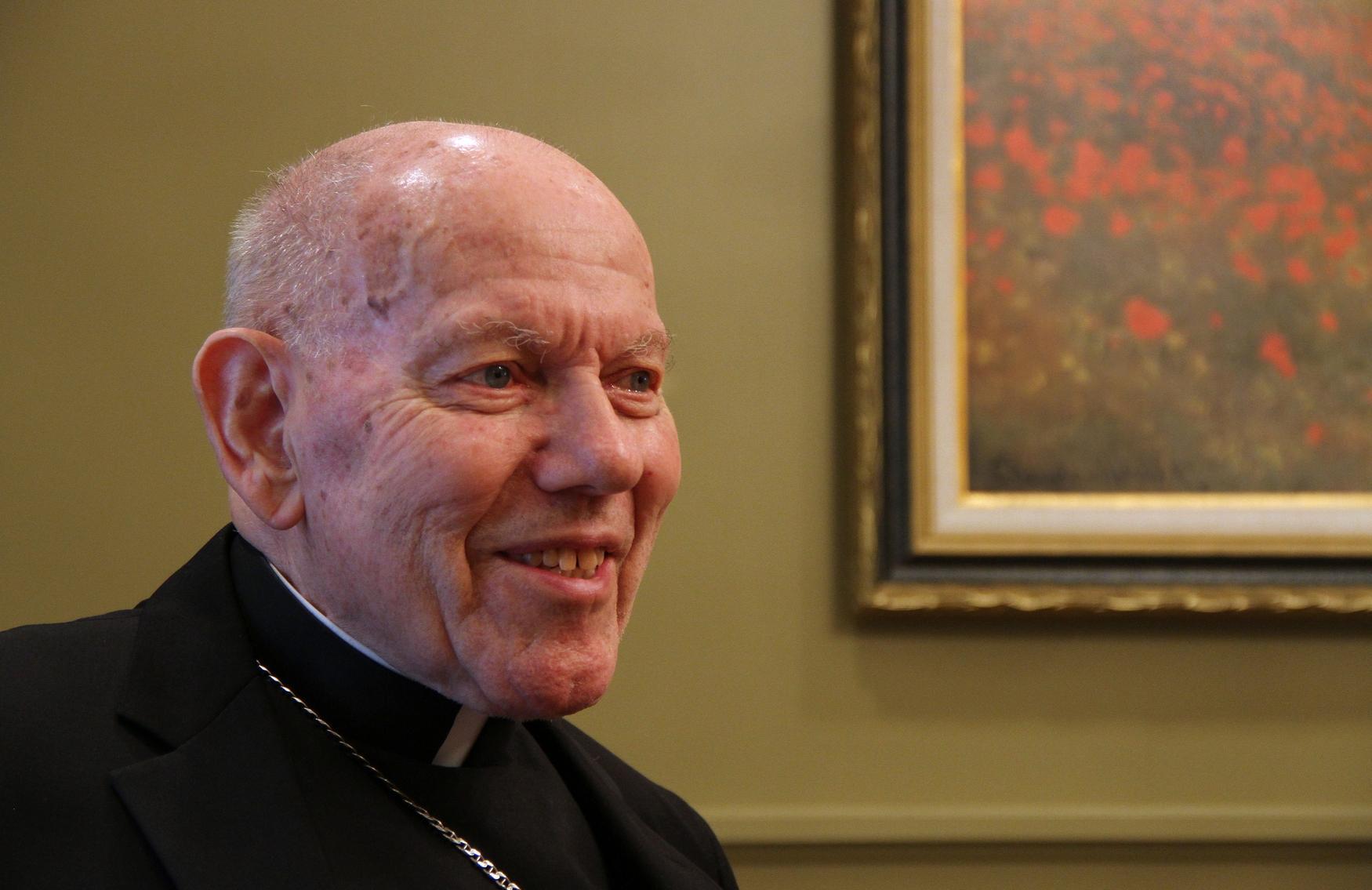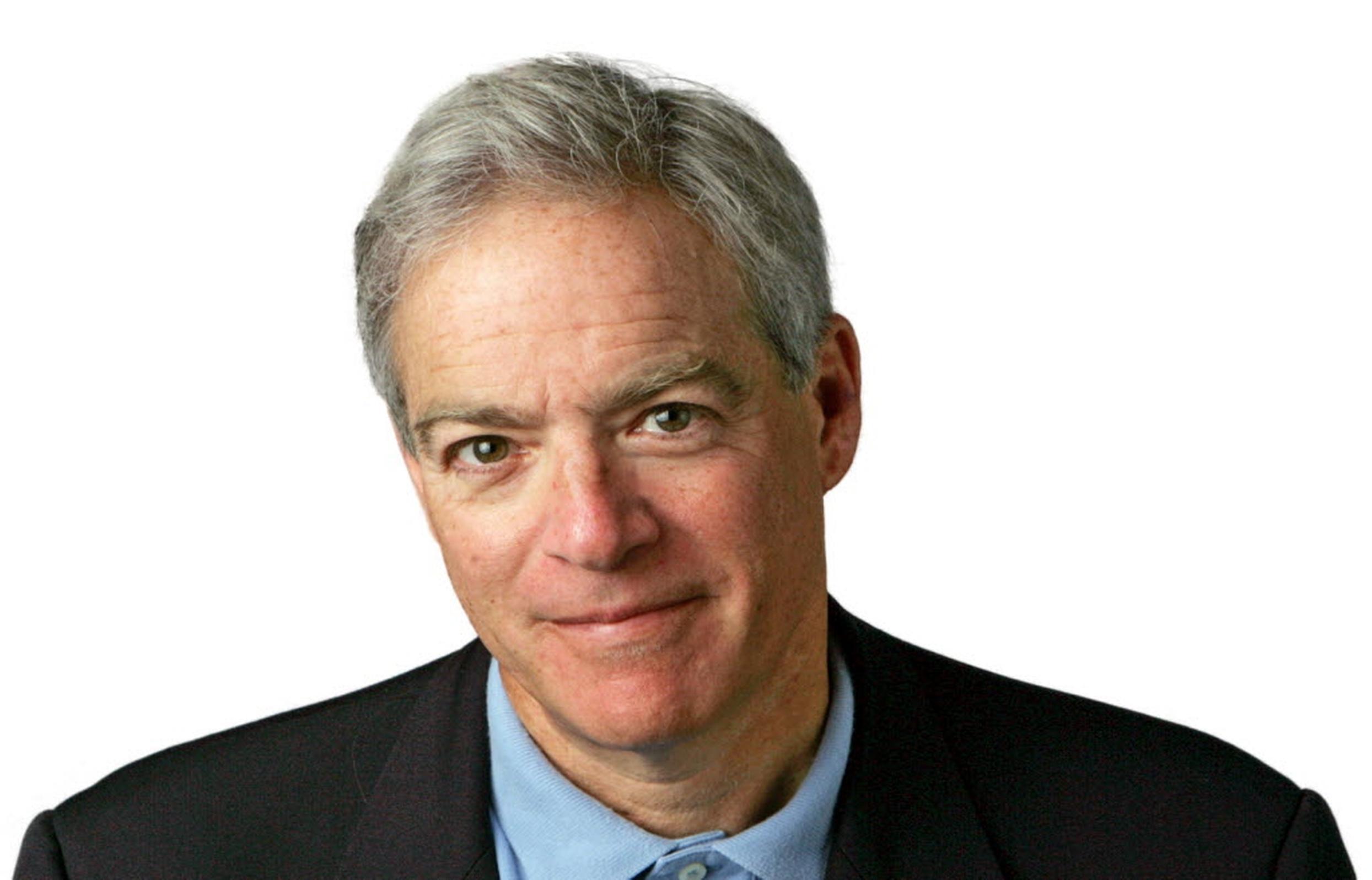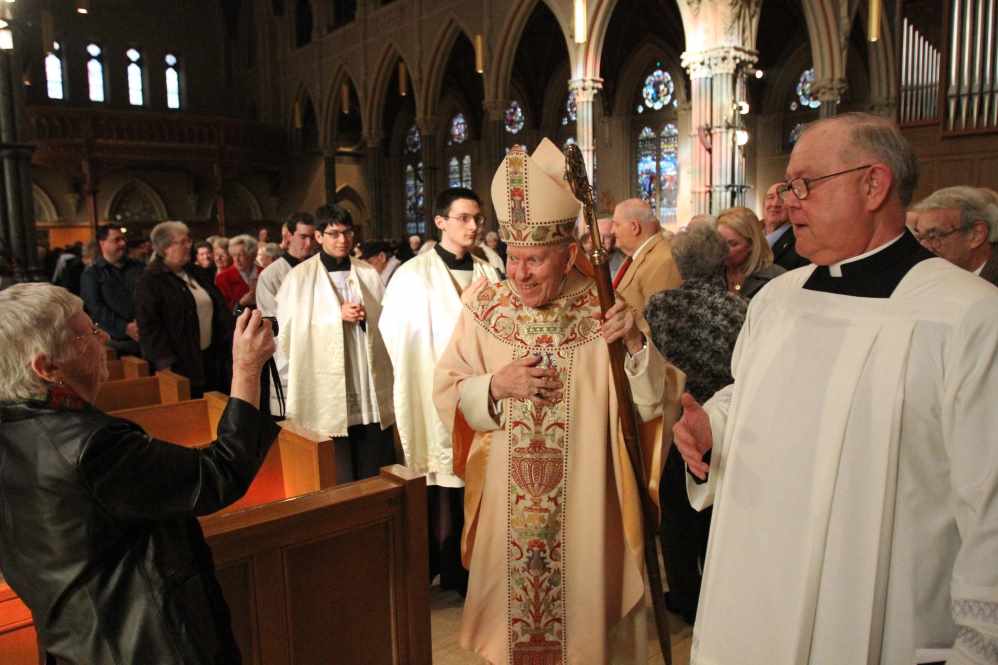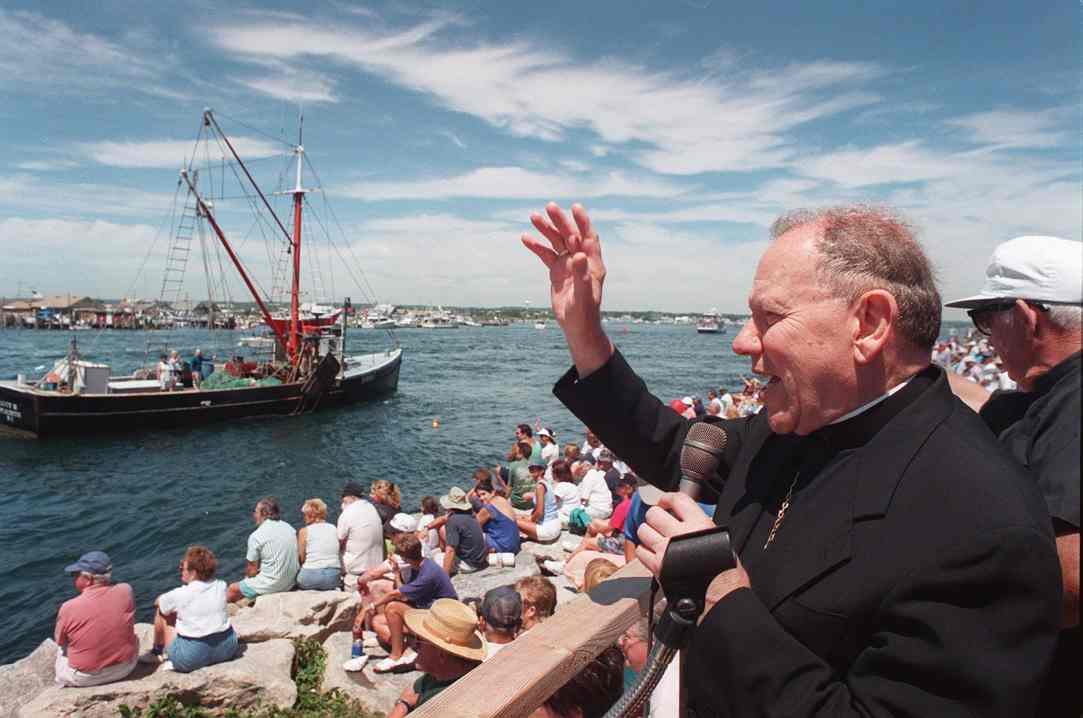|
Turning 90, former Bishop Gelineau says ‘God has been good to me’
By Mark Patinkin
[with video] Long-retired leader of Providence Diocese sits down to discuss his career, continued religious work, and the Church’s handling of a long-running sexual-abuse scandal. Retired Bishop Louis Gelineau greeted me with a firm handshake while keeping his other hand on his walker. I’d learned he turns 90 on Thursday, so I had come to see him at the Villa at St. Antoine in North Smithfield, the assisted-living facility that’s now his home. I’d covered Gelineau a few times years ago and remembered his proper public persona. But I’d never sat with him and was struck by his openness, even about difficult matters like the church sex-abuse scandal. He led me to a lounge and sat carefully on his walker’s padded seat. He smiled and said: “They’re warning me not to fall.” He still has the same fast-paced chat I recalled from his 25 years as the sixth bishop of Providence, from 1972 to 1997. “I tell you what,” said Gelineau, “old age has set in. I used to be 5-8, but the last few years I’ve gone down, down, down. Arthritis. That’s what the problem is.” He’s had both knees replaced but last February his left one gave way and he had to move to the St. Antoine nursing home next door for months of rehab. But he recovered and is back living independently here in his apartment. “My vital signs have been good,” said the bishop. “I eat well. I sleep well. God has been good to me.” I asked if he still has family. “I had an older brother and a younger brother,” said Gelineau. “They’re both gone now.” But the older brother had three sons and three daughters who visit. And the younger brother? “He was a special-needs fellow,” said the bishop. “Norman. There was a lack of oxygen at birth.” As a kid, Gelineau was expected to always bring Norman along when he went out with friends, which helped shape his feeling for those in need. St. Antoine is a gracious facility outside Woonsocket, and Gelineau has history there. It was built under the Diocese of Providence when he was bishop, and in 2004, seven years after he stepped down, he moved in as full-time chaplain. He spent the next decade ministering to a group slightly smaller than the 600,000-plus Catholics he served as bishop — the 75 folks at the Villa and another 260 at the adjoining St. Antoine Residence, which provides more skilled care. But it was a busy job — he was often awakened to anoint the sick. In his mid-’80s, Gelineau moved on for a last chance to be part of a parish again, living at Precious Blood Church in Woonsocket and assisting the priest there. But in late 2015, he moved back to the Villa and began true retirement at age 87. Christine Riel, St. Antoine administrative assistant, told me “retirement” is the wrong word — Louis Gelineau is still active as a pastoral presence, from taking confessions to helping at chapel Mass. One of Gelineau’s close pals at St. Antoine is retired Monsignor George Frappier, 88, who worked with the bishop as the diocesan vicar for social ministry, one of the bigger jobs there. “I’ve been trying to teach him the word ‘No,’” Frappier told me. “It’s not in his vocabulary.” Despite the walker, Gelineau still heads out often to do funerals, confirmations and gatherings like a recent Knights of Columbus convention in Warwick, Frappier said. That was Gelineau’s style as bishop — he showed up for everything, including radio talk-show interviews and even factories to greet workers. Tellingly, Riel said Gelineau did her own confirmation in 1980 in Lincoln and, years after he retired, was there doing her son’s at St. Agatha’s in Woonsocket in 2007. The bishop still wears his Roman collar every day. His friend Monsignor Frappier joined us at lunch in regular clothes, joking, “I’m old and retired — I deserve to relax without something wrapped around my neck.” I asked Frappier for an honest assessment of Gelineau. “I worked under four bishops,” Frappier said, “and he was the best of the best. He wasn’t hanging on your back all the time. He trusted you.” I asked about changes in the church, and the bishop said he’s concerned about a decline of faith. “It’s a cultural change,” he said. “People are distracted; they want to go where they’re entertained, so they aren’t reaching out to religion as a priority in their lives.” He went on: ”‘It’s not fun’ — that’s what a lot of them say. Well, you don’t go to church for fun — you go to believe in God and ask for his help.” He’s concerned also about the decline in priests. Indeed, the diocese told me Rhode Island has gone from 306 active priests when Gelineau arrived in 1972 to 220 when he retired in 1997 to only 140 today. They serve 134 churches, 20 fewer than in the early 1970s. “We had parishes with two or three priests,” Gelineau said. “You don’t see that anymore.” Then I asked about the impact of the church sex-abuse scandals. “That was harmful to us, yes,” Gelineau said. “I was in office when that came to us.” I reminded him the Providence Diocese in 2002 paid $14 million to settle dozens of cases, many from during his years, and lawyers claimed a pattern of covering up abuse. “That was the whole question against Cardinal Law,” said Gelineau of the Boston bishop who resigned in 2002. “He had a lot going on and didn’t take the steps he should have.” And Gelineau? “As soon as I knew — we set up an office for handling that. And it’s still there to reveal the truth.” Monsignor Frappier headed that committee and he said one of their first actions was hiring a retired Massachusetts state trooper to investigate by the book. I pressed the bishop, pointing out that lawyers representing three men who sued for abuse claimed that documents show Gelineau transferred one accused priest to a new church where he abused again. The bishop said the truth wasn’t clear at first. “It was a confusing time,” he said, “a terrible time, involving many people.” He went on: “It was a shock to us that this might be going on. But as soon as we found there was credibility, no, they couldn’t continue as a priest.” I told him that in 2008, Superior Court Judge Netti Vogel, who heard a case on releasing church abuse documents, said Gelineau had been a “see-no-evil, hear-no-evil type of guy.” “I never intended that,” he said quietly. “In my conscience, we weren’t covering up.” He said they were simply struggling to understand where the truth lay. Does he think about it still? “Oh, yes,” the bishop said. “It was very painful. It hurt me and hurt the church.” He spoke gravely now. “It’s so contrary to what we stand for. We believe we’re to bring people away from sin and live by the commandments. It was very painful that we ourselves would be involved in things so sinful and wrong.” In a soft voice he said, “I have such regret.” Gelineau was 26 when he was ordained in 1954 in his hometown of Burlington, Vermont. He told me he was at first crushed when he was given his first parish assignment — the tiny Vermont town of Richford, on the Canadian border. It was isolated and he knew no one. “But it became two of the happiest years of my life,” he told me. “We worshiped together and I became part of their families.” They even skied together at nearby Jay Peak — Gelineau said he stuck to the easy slopes. He told me: “I realized what a mistake I’d made, worrying about my will instead of following God’s will.” But the same thing happened after 18 years working at the Burlington Diocese and rising to second in command under Bishop Robert Joyce, who talked him up to Rome. In 1972, the Vatican assigned Gelineau to succeed Rhode Island’s Bishop Russell McVinney, who had died in office. Again, Gelineau was miffed — he was happy in Vermont. “The pope wants you to go to Providence,” said Joyce, “so you go.” Gelineau did go, felt instantly embraced and ended up finding his true home here. After retiring at age 69, he spent the next years doing events and outreach from a diocesan office, but he took three months away three times when asked by Holland America to join long cruises as onboard clergy. He was given a cabin in exchange for pastoral duties. “They had a rabbi, a Protestant minister — there were three of us,” Gelineau recalled. “Oh, it was wonderful.” He joked that the cruises had the added benefit of getting him “out of the hair” of his successor, Bishop Robert Mulvee. Bishop Gelineau wakes each day before 6 a.m., puts on his black clerics and hits the dining room at 7, having breakfast with Normand Courtemanche, a retired priest who’s battling the effects of a stroke. “He has difficulty speaking,” said Gelineau, “but I watch his lips and we get along fine.” Afterward, Gelineau heads back to his room, reads The Providence Journal and goes to Mass at 9:30. After 11:30 lunch, he does more reading, often Thomas Aquinas, considered the church’s greatest theologian. He does exercise classes three times a week. “We’re sitting down like I am now,” the bishop said from his walker, “and you move your legs and your shoulders — that’s especially good with this arthritis problem I have.” At 4 p.m., he goes back to the chapel to say the rosary with others — it’s more meaningful to him when shared. He does the first supper shift at 4:30 p.m. so he has time afterward, writing talks for events or ministering to residents who seek him out. From time to time, friends like Robert Lafond, a deacon at St. Aidan Church in Cumberland, come by to visit or take him to restaurants; Gelineau’s taste ranges from The Old Canteen to Chelo’s. Lafond told me he’s inspired by the bishop: “He’s still working hard. He’s in assisted living, but is assisting everyone he’s with.” As we finished lunch, Gelineau said that until a year or so ago, he was able to drive his Chevy, but can’t anymore since he lost all sight in his right eye due to macular degeneration. He added that he gave up his beloved twice-a-day cigars eight years ago. After two hours together, I had to go and he stood to escort me, chatting rapid-fire as we went: “The walker is very helpful, I must say. The people here — must be about 80 percent of them have walkers — and I was thinking I’ll never need one. But now I treasure it.” Gelineau looked at me and added: “I’ve had a great life. I tell people if you hear me complaining, shoot me, because God has been good to me.” I told him goodbye, then watched as the sixth bishop of Providence, moving quickly with his walker and saying hello to all he passed, headed down the hall to his apartment.
|
.
Any original material on these pages is copyright © BishopAccountability.org 2004. Reproduce freely with attribution.



